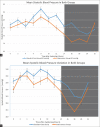Effect of Chronotherapy of Antihypertensives in Chronic Kidney Disease: A Randomized Control Trial
- PMID: 33994681
- PMCID: PMC8101668
- DOI: 10.4103/ijn.IJN_322_19
Effect of Chronotherapy of Antihypertensives in Chronic Kidney Disease: A Randomized Control Trial
Abstract
Introduction: There is a higher prevalence of non-dipping pattern in hypertensive chronic kidney disease (CKD) patients. Nocturnal hypertension has been shown to predict cardiovascular mortality and morbidity and is often superior to daytime blood pressure. We studied the effect of shifting or adding antihypertensive to night time on blood pressure profile of CKD III-IV patients.
Methods: In this single-center, prospective, randomized controlled trial, eligible participants were adults from eastern India aged 18-65 years with CKD stages 3 and 4, with a non-dipping pattern on ambulatory blood pressure monitor (ABPM). The intervention group received all the antihypertensives in the night time whereas the standard care group continued to take the medication in the morning. Both groups were followed up for 1 year. The primary outcome was the number of patients changed from non-dippers to dippers in the standard care group and intervention group. Secondary outcomes included a change in estimated glomerular filtration rate (eGFR) and change in the cardiac structure.
Results: 39 patients in the intervention group and 36 patients in the standard care group were analyzed. 10 patients (26%) reverted to dipping pattern in the intervention group as compared to none in the standard care group. Mean changes in eGFR were -2.55 and -0.18 mL/min/1.73 m2 in the standard care and intervention group at the end of the study, respectively. Between-group difference in eGFR was significant at 1 year (5.22 [95% CI, 4.3-6.1] ml/min/1.73 m2); (P = 0.03). The cardiac structure showed no significant changes in either group.
Conclusions: Bedtime administration of antihypertensives reverted non-dippers to dippers and slowed the decline in eGFR in CKD stages 3 and 4 compared to morning administration of antihypertensives.
Keywords: ABPM; antihypertensives; chronic kidney disease; dippers; hypertension; nocturnal hypertension; non-dippers.
Copyright: © 2020 Indian Journal of Nephrology.
Conflict of interest statement
There are no conflicts of interest.
Figures


References
-
- Coresh J, Wei GL, McQuillan G, Brancati FL, Levey AS, Jones C, et al. Prevalence of high blood pressure and elevated serum creatinine level in the United States: Findings from the third National Health and Nutrition Examination Survey (1988-1994) Arch Intern Med. 2001;161:1207–16. - PubMed
-
- Buckalew VM, Berg RL, Wang SR, Porush JG, Rauch S, Schulman G. Prevalence of hypertension in 1,795 subjects with chronic renal disease: The modification of diet in renal disease study baseline cohort. Am J Kidney Dis. 1996;28(6):811–21. - PubMed
-
- Hermida RC, Ayala DE, Fernández JR, Portaluppi F, Fabbian F, Smolensky MH. Circadian rhythms in blood pressure regulation and optimization of hypertension treatment with ACE inhibitor and ARB medications. Am J Hypertens. 2011;24:383–91. - PubMed
LinkOut - more resources
Full Text Sources
Other Literature Sources
Research Materials
Miscellaneous
